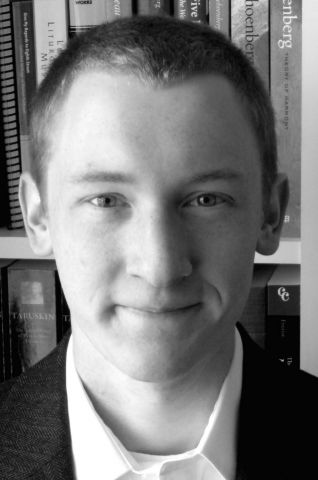
Daniel Tacke has been told he began playing piano at age 3, but he doesn’t remember his first lesson.
“This goes back further than my memory does,” Tacke said.
Tacke, a native of Seattle, joined the Hillsdale music staff this year as a Visiting Associate Professor of Music, focusing on teaching basic and complex theory along with composition. He also continues to compose and to practice his three instruments: piano, organ, and — his favorite — harpsichord.
“He is noticeably brilliant, but he actually weighs your opinion and your answers to his questions in a really humble manner. He takes the students really seriously, like they’re going to say something he cares about and doesn’t know,” said junior Brendan Ammerman, who is taking two classes and auditing a third with Tacke.
Tacke said he always knew he’d be a musician.
“It’s never been the sort of thing that becomes a chore,” Tacke said. His love for music brought him to Oberlin Conservatory of Music as an undergraduate and University of California, San Diego for two graduate degrees in composition.
Tacke said he spent his undergraduate years accumulating skills in theory and composition so that in his graduate degrees he could use those skills to further compositional research. One topic that caught his attention was music notation — the process of actually writing composed music.
“Music notation has a kind of poetic function in addition to the literal meaning of symbols,” Tacke said. “A cursory example of this would be something like you come to a measure of rest in a piece. You could notate that measure with a whole rest. You could notate that with a [grand pause] and a fermata. You could notate that measure by literally wiping the staves off the page and having literal white space. In a clinical way they all mean the same thing, but the experience of them is very different.”
Though Tacke said the topic enthralls him now, his interest in composition didn’t begin until about high school. He began composing simply by playing around on the piano and writing pieces for himself.
Partway through high school, the Seattle Symphony in his hometown offered an opportunity for young composers to write music for the symphony to perform. Tacke completed the “fierce” application, was accepted, and began to compose his first piece of symphonic music: a two-movement string quintet.
“It was a learning piece,” Tacke said.
Tacke was not used to writing for instrumentalists and had to learn the advantages and limitations of other instruments, a process he continued to learn through the rehearsals. Even after the music was finalized on the page, however, it wasn’t entirely complete.
“Music needs people,” Tacke said. “The kinds of things that happen in performance, the way music is interpreted, the way it takes on its expressive essence through a human being, I often come back to how music is an essentially human thing.”
The performance of the quintet was Tacke’s first experience hearing his music performed by other musicians, and he described it as both terrifying and thrilling.
“To have something I had spent a lot of time on and thought I knew, to have it transformed was a really eye-opening experience,” Tacke said.
At the conservatory, Tacke watched as his compositions were repeatedly transformed from written notes to energetic performances. He continued to write music during his time teaching at Oakland and then Arkansas State University, and he has not quit composing — primarily chamber music — while working at Hillsdale.
“There’s a real cohesiveness and totality to everything he does,” Ammerman said. “He gets specific and is very objective and concrete, but he always ties it back to music as a whole, why it matters as a musician and music lover, but even more how we engage in music and find meaning in it.”
Tacke engages the students in class with his energetic teaching style, impressive piano performance even when simply demonstrating concepts, and a creative vocabulary — he describes notes as “delicious” — according to sophomore Catherine Howard who is in his Theory 2 lecture and lab. Tacke recently assigned many of his students to compose a piece of classical music.
“I have never composed before, but I think it really brings theory all together and it’s very good because what we’ve been learning in class we’re able to actually use: all the stuff we learned about great composers such as Bach and Mozart, we can actually use those things and see how you can create music that’s aesthetically pleasing,” Howard said.
Though Tacke’s conservatory education was very different from a liberal arts one, he teaches with an emphasis on understanding the whole.
“I just know that he is making music the coolest thing ever and I want to pursue it with all my heart, and I don’t know how to communicate that to people,” Ammerman said.

